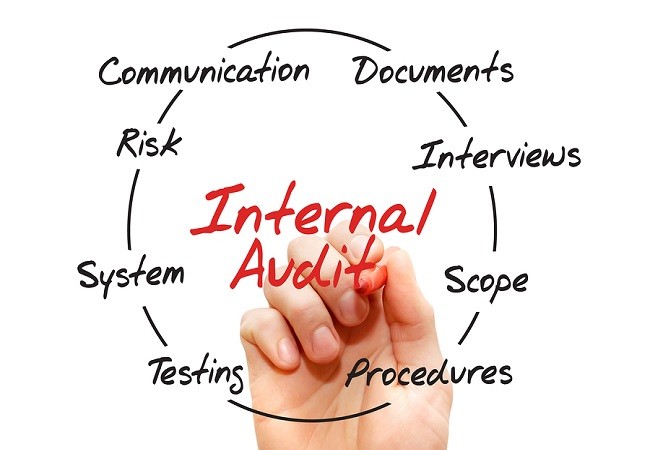The Objectives and Importance of Internal Audit

Internal Audit
An Internal Audit is a review of the operations and records. An Internal audit is a thorough examination of the accounting transactions as well as of the system according to which these have been recorded, with a view to reassuring the management that the accounts are being properly maintained. The Institute of Internal Auditors defined Internal Auditing as under:
"Internal Auditing is an independent, objective assurance and consulting activity designed to add value and improve an organization's operations. It helps an organization accomplish its objectives by bringing a systematic, disciplined approach to evaluate and improve the effectiveness of risk management, control, and governance process."
Objectives of Internal Audit
The objectives of the Internal Audit can be stated as follows:
⮚ To verify the accuracy and authenticity of the financial accounting and statistical records maintained by the management.
⮚ To ascertain that the standard accounting practices, as have been decided, are followed.
⮚ To ascertain that there is a proper authority for every acquisition, retirement, and disposal of assets.
⮚ To analyze and improve the system of internal checks, in particular, to see:
a) that it is working,
b) that it is sound, and
c) that it is economical.
⮚ To facilitate the prevention and detection of fraud.
⮚ To examine the protection afforded to assets and the uses to which they are put.
⮚ To confirm that liabilities have been incurred only for the legitimate activities of the organization.
⮚ To make special investigations for management.
⮚ To provide a channel whereby new ideas can be bought to the attention of management.
⮚ To review the operation of the overall internal control system.
⮚ To bring material departures & non-compliances to the notice of the appropriate level of management.
The methodology used in an Internal audit
The methodologies are followed by an Internal Auditor while performing the Internal Audit;
✔ Defining the scope of an Internal Audit is primarily important.
✔ Drafting the Risk Assessment Matrix is the next step.
✔ A detailed Internal Audit plan is required to be drafted on the basis of risk.
✔ Once the drafted plan has been accepted, it is required to be executed.
✔ Submit the audit result to the management with follow-up actions.
Role of an Internal Auditor
The person conducting an Internal Audit within the organization is considered as an Internal Auditor.
✔ Internal Auditor's role is to provide the management with independent assurance on the organization's internal controls, risk management strategies, and governance operating effectively.
✔ Internal Auditors' function includes supervising, evaluating, investigating, and analyzing the risks & controls; checking and ensuring information and compliance with policies, procedures, and laws.
✔ The Internal Auditor will assess the achievement of goals and objectives set by the Senior management.
✔ In the case of short of stated goals, the auditor will identify process gaps and make suggestions for improvement for bridging the same.
Independence of Internal Auditor
✔ The internal auditor, shall either be a chartered accountant whether engaged in the practice or not, or a cost accountant or such other professional as may be decided by the Board of Directors.
✔ The Audit Committee or the Board shall, in consultation with the Internal Auditor, formulate the scope, functioning, periodicity, and methodology for conducting the internal audit.
✔ It may also be noted that the Central Government may, by rules, prescribe the manner and Procedure for the same.
✔ The concept of independence is equally relevant for the internal auditor also.
✔ Internal auditing is an independent, objective assurance and the consulting activity is designed to add value and improve an organization’s operations.
✔ An Internal auditor is part of the management, but he evaluates the functioning of the management at different levels.
✔ Therefore, to be efficient and effective, the internal auditor must have adequate independence. But the internal audit function cannot be expected to have the same degree of independence as is essential when the external auditor expresses his opinion on the financial information.
✔ The internal auditor should directly communicate with the Board of Directors and Audit Committee. This ensures more independence.
✔ The independence of the auditor will be affected if he is made subordinate to a lower level. Thus, this will affect his functioning as well as his effectiveness.
General evaluation of Internal Audit work by an External Auditor
The External Auditor should review the Internal Auditor's work, taking into account the following factors:
✔ The scope of work and related audit programs are adequate for the external auditor's purpose.
✔ The work was properly planned and the work of the assistants was properly supervised.
✔ Sufficient appropriate evidence was obtained.
✔ Conclusions reached are appropriate in the circumstances.
✔ Any unusual matters disclosed by the internal auditor procedures have been properly resolved.
Relationship between the Statutory and the Internal Auditors
✔ The function of an internal auditor is an integral part of the system of internal control, it is obligatory for a statutory auditor to examine the scope, independence, and effectiveness of the work carried out by the internal auditor.
✔ If the statutory auditor is satisfied upon examination of the work of the internal auditor, that the internal audit has been efficient and effective, he may accept the checking/evaluation carried out by the internal auditor in the area of internal control, verification of assets and liabilities, etc.

